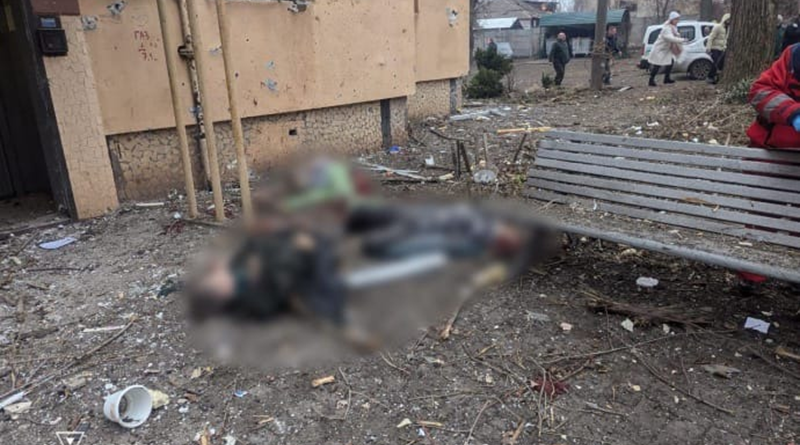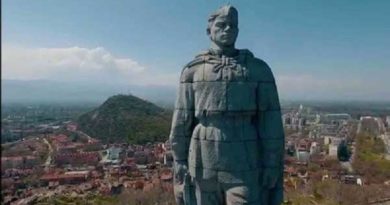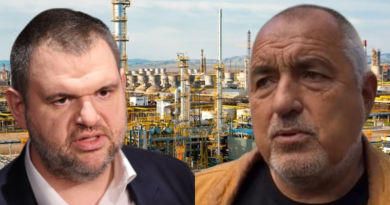Radev The Hybrid President: Between Cynicism, Partisanship, and Moral Collapse
On April 3, 2025, Vladimir Putin, the self-proclaimed “grand strategist,” orchestrated a chillingly precise drone assault on civilian targets in Krivoy Rog, Ukraine. The strike left 16 dead—among them 6 children—turning homes into rubble and families into mourners. On that same grim day, Bulgaria’s “even more exceptional” strategist, President Rumen Radev, chose to reiterate his opposition to military aid for Ukraine. In doing so, he effectively condemned the only lifeline Ukraine has to fend off such atrocities and protect its most vulnerable—its children, its elderly, its future. This wasn’t a slip or a random alignment of events; it’s a mirror reflecting a mindset that demands dissection.
Radev isn’t some detached figure fumbling in the dark. As Bulgaria’s head of state, he’s privy to the full spectrum of intelligence—detailed briefings, satellite imagery, intercepted communications—that our services can muster and that he may ask for. He knows the architects of this war: Russia’s unprovoked invasion, its methodical erasure of Ukrainian cities, its tally of civilian blood now in the tens of thousands. He grasps what peace entails—not empty pleas for talks, but the concrete means for a battered nation to resist annihilation. Yet, with this knowledge, he doubles down, insisting military aid “prolongs the conflict.” Why? Two explanations loom, each unsettling, with the truth likely a murky fusion of both.
A Mind Shackled by Soviet Ghosts
First, consider an inability to face reality, born of a consciousness warped by Soviet indoctrination. Imagine a psyche forged in the crucible of Cold War dogma, its receptors locked into reciting the hymns of the “Soviet man.” For this archetype, morality bends to ideology, facts dissolve before loyalty, and the sole duty is to echo the “Party line”—no matter how hollow it rings. In Radev’s head, there’s no bandwidth for the screams of Krivoy Rog’s children or Ukraine’s right to defy genocide. Instead, the script plays on loop: “NATO provokes,” “Russia defends,” “Moscow brings peace.” Boil him, bake him, strip away the layers—he clings to one unshakable tenet: “Russia is always right.”
This paints him as a relic, an indirect casualty of his era. Born in 1963, Radev came of age under socialism, training as a fighter pilot in a Bulgaria tethered to the Warsaw Pact. His career soared through the 1980s, a time when loyalty to Moscow was drilled into every officer, and the West was the eternal foe. Even as Bulgaria pivoted to NATO and the EU after 1989, Radev’s worldview seems frozen in that past despite his studies in the US. His early presidency offers clues: in 2017, he balked at EU sanctions on Russia over Crimea’s annexation, framing them as “counterproductive.” In November 2021, days before his re-election, he called Crimea “currently Russian” on live TV—a diplomatic bombshell that stunned allies. By 2022, as Putin’s tanks rolled into Ukraine, Radev dubbed military aid a “step toward war,” ignoring the war already raging. This isn’t mere stubbornness; it’s a mental cage, built from decades of conditioning, that blinds him to evidence and traps him in nostalgia.
Support Independent Analysis
Help us keep delivering free, unbiased, and in-depth insights by supporting our work. Your donation ensures we stay independent, transparent, and accessible to all. Join us in preserving thoughtful analysis—donate today!
A Cynic Playing a Calculated Game
The second explanation cuts deeper and darker: Radev knows the score but chooses this path for personal gain. Cynicism, not ignorance, drives him. Politically, his pro-Russian slant locks in a vocal constituency—Bulgarians who pine for Soviet days or see Russia as a bulwark against “Western decadence.” In a nation where 20-30% still view Russia favorably (per 2024 Alpha Research polls), this is electoral gold. Materially, whispers of deeper ties swirl—unproven but persistent. His 2021 campaign overlapped with figures like Nikolai Malinov, the “Russophiles” leader charged with espionage for Moscow in 2019, yet spared jail in a murky plea deal. Energy deals—like the TurkStream pipeline, the Botash deal fostering Russian gas based Turkish Gas Hub, pushed during his tenure—raise eyebrows about Russian influence peddling.
Then there’s the personal sting: an inferiority complex toward Volodymyr Zelensky, Ukraine’s wartime Churchillian leader. Their clash in Sofia on July 6, 2023, was a study in contrasts. Radev, perched in his polished office, peddled “diplomacy over weapons” to a man who’d just dodged shells in Bakhmut. Zelensky, boots gritty with frontline mud, didn’t mince words: he demanded air defenses and ammo, not lectures. The exchange—caught on camera—left Radev floundering, his rehearsed pacifism exposed as flimsy next to Zelensky’s raw resolve. That humiliation lingers, perhaps stoking a petty grudge that hardens his stance. It’s not just politics; it’s hurt pride.
The Hybrid: Cynic, Zealot, and Enabler
Reality likely melds both—a hybrid of cynicism and partisanship, with Radev as both puppet and puppeteer. He’s a cynic, gaming Bulgaria’s fractured politics for power, and a zealot, wedded to Moscow as the font of “truth.” The first traps him in his own biases, a prisoner of Soviet echoes; the second casts him as a deliberate actor in Russia’s geopolitical playbook. Either way, the outcome is damning: he denies Ukraine’s right to shield its children from Putin’s butchery. On April 3, as Krivoy Rog are yet to bury its dead, Radev didn’t decry the drones—he decried the aid that could stop them. This isn’t dissent; it’s a posture that tacitly blesses terror.
What do you call a man who, even while preaching ceasefires, strangles the victims’ right to fight back? A man who, as six children’s bodies are pulled from wreckage, opts to scold those arming their defenders? This isn’t moral blindness or naive idealism—it’s worse. It’s complicity by omission, draped in the sanctimony of “principle.” Radev may see himself as a sage peacemaker, steering Bulgaria above the fray, but he’s a mouthpiece for murderers, fully aware of the blood on the ground. If this isn’t a betrayal of the human values Bulgaria pledges to uphold in the EU and NATO—values of solidarity, justice, freedom—what is?
The Bigger Picture
Radev’s stance isn’t just a personal quirk; it’s a symptom of Bulgaria’s unresolved tug-of-war between East and West. His vetoes of arms shipments—like the 2022 block on 100 armored vehicles for Ukraine—delay aid while Russia’s bombs fall. His rhetoric emboldens pro-Kremlin voices like “Vazrazhdane,” whose leader Kostadin Kostadinov parrots the same “peace at any cost” line. Meanwhile, Ukraine bleeds—6 kids on April 3, how many tomorrow?—and Bulgaria’s president shrugs. He’s not alone; allies like Hungary’s Orbán tread a similar path. But Radev’s hybrid act—blending sanctimonious denial with calculated posturing—stands out for its gall.
This isn’t about peace. It’s about power, pride, and a perverse loyalty that costs lives—none of them his. While he pontificates, Ukraine buries its future. If Bulgaria’s leader can’t see that—or worse, won’t—what’s left of his claim to moral authority?
Ilian Vassilev




